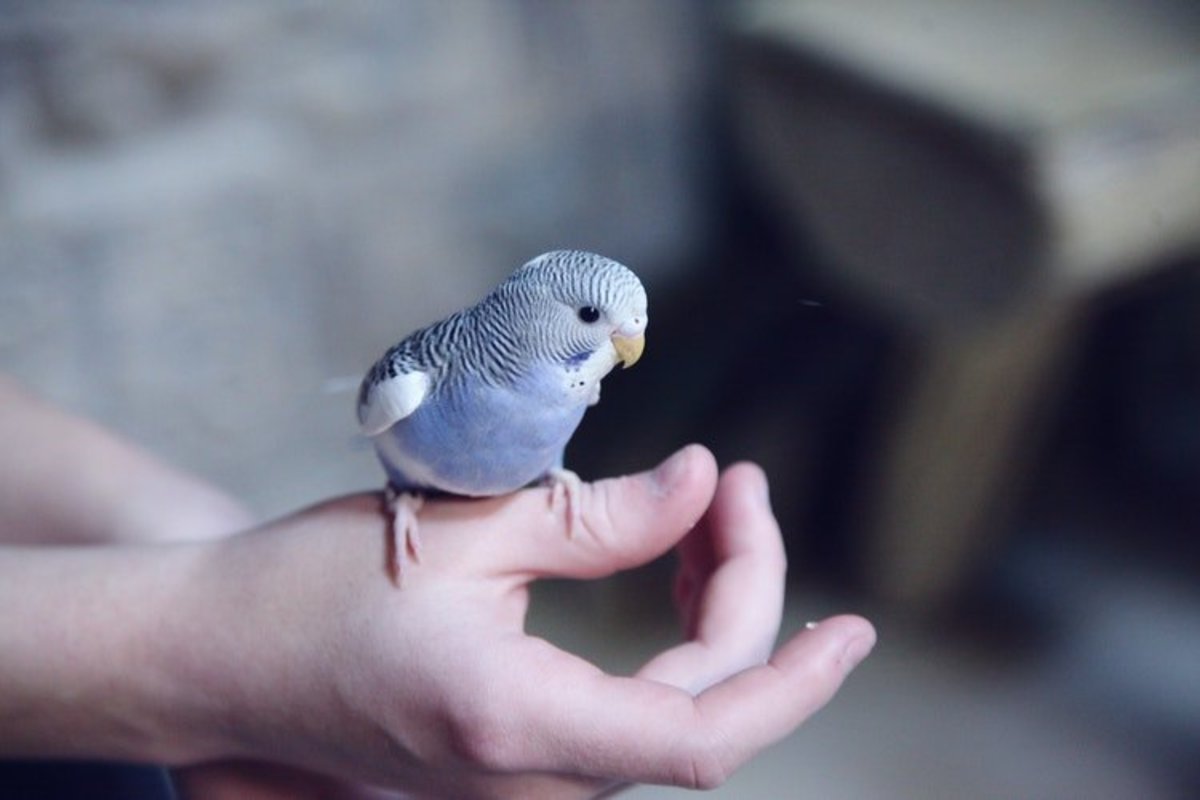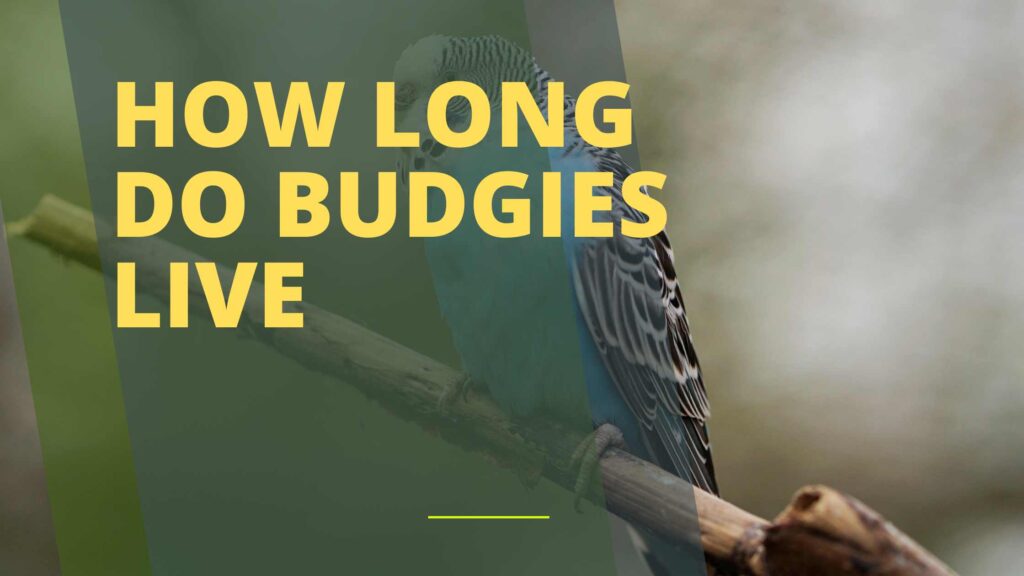Budgies typically live for 5 to 10 years. Proper care can extend their lifespan up to 15 years.
Budgies, also known as parakeets, charm pet owners worldwide with their vibrant colors and cheerful chirping. Originating from Australia, these small parrots make excellent companions due to their social and affectionate nature. They thrive in environments that provide mental stimulation, a nutritious diet, and regular veterinary check-ups—keys to a longer and healthier life for these avian friends.
Their relatively easy care requirements and ability to bond with their owners make budgies especially popular among beginner bird enthusiasts. Creating a safe and engaging habitat for your budgie can lead to many years of shared joy and companionship.
Budgies: Vibrant Companions
Imagine a splash of color and a chirp of joy in your home. That’s what budgies bring to the table.
These small, lively birds light up life with their vibrant personalities.
They’re the feathered friends you didn’t know you needed. With their impressive lifespan,
they become long-term companions who add brightness to every day.
Why Budgies Are Popular Pets
- Affectionate and sociable, they easily bond with their owners.
- They’re easy to care for, perfect for both new and experienced pet owners.
- Budgies thrive in small spaces, making them ideal for apartments.
- They have the ability to learn to talk, mimicking human speech.
Characteristics Of Budgies
| Characteristic | Description |
|---|---|
| Color Variations | Budgies come in a wide range of colors, from greens to blues. |
| Size | They are small birds, typically 18 cm in length including the tail feathers. |
| Lifespan | With proper care, they can live up to 10-15 years. |
| Personality | Known for their playful and friendly nature. |

Credit: pethelpful.com
Lifespan Variations Among Budgies
The lifespans of budgies can vary quite a bit. This variation often depends on whether they live in the wild or in captivity. It also hinges on factors such as diet, care, and environmental conditions. Knowing these differences helps budgie owners understand how to enhance their pet’s life.
Average Lifespan In Captivity
Captive budgies often enjoy longer lives compared to their wild relatives. With proper care, these colorful little birds can live between 8 to 15 years. Quality of life plays a huge role in this. A balanced diet and regular veterinary care are crucial. Additionally, a clean, spacious cage and plenty of mental stimulation contribute to their longevity.
Comparing Wild And Domesticated Lifespans
Wild budgies face natural predators, harsh climates, and food scarcity, limiting their lifespan. They tend to live for about 4 to 6 years in their natural Australian habitats. Domesticated budgies, shielded from such challenges, have the potential to surpass this range significantly. Pet owners’ commitment to their budgie’s health can bridge this lifespan gap.
Crucial Factors Affecting Budgie Longevity
Understanding the lifespan of budgies involves several crucial factors. Just like the pieces of a puzzle, each factor contributes to the overall longevity of these joyful companions. Let’s dive into the essentials that can help your budgie live a longer, healthier life.
Diet And Nutrition
Budgies thrive on a balanced diet.
- Quality seed mix: Forms the core of their meals.
- Fresh fruits and vegetables: Provide essential vitamins.
- Clean water daily: Keeps them hydrated.
A budgie’s diet directly impacts its health and lifespan. Limit treats and avoid foods harmful to birds.
Exercise And Entertainment
Active budgies are healthy budgies.
- Ample flight time: Ensures physical fitness.
- Interactive toys: Keeps their mind sharp.
- Social interaction: Essential for emotional well-being.
Combine daily activities with a stimulating environment for best results.
Genetics And Breeding
Genetics play a pivotal role in a budgie’s longevity.
| Inherited Traits | Impact on Longevity |
|---|---|
| Strong genes | Increases life potential |
| Weaker genes | May lead to health issues |
Choose a reputable breeder to ensure a healthy genetic lineage.
The Impact Of Environment
The robustness and vitality of budgies are closely tied to their environment. A harmonious and suitable environment can potentially extend a budgie’s lifespan. Let’s explore key environmental factors that play a pivotal role in the longevity of these charming birds.
Cage Size And Placement
A spacious cage enables budgies to flutter and exercise, which is essential for their health. Witnessing budgies in a cramped space is not only disheartening but also detrimental to their lifespan. Here are some points to consider regarding cage size and placement:
- Vertical space is as crucial as horizontal room for these high-flyers.
- A cage should be at least 18x18x18 inches for a single budgie.
- Place the cage in a spot with mild sunlight and no drafts.
- Ensure the cage location is away from kitchen fumes and harsh noise.
Social Interaction And Stress Levels
Budgies are inherently social creatures that thrive on interaction. A solitary budgie may succumb to loneliness and stress, affecting its health and lifespan. Here’s how social interaction and stress levels impact a budgie’s life:
- Consistent interaction with humans or fellow budgies can keep a budgie mentally stimulated.
- Frequent and gentle handling builds trust and reduces stress.
- Exposure to stressors like excessive noise, predators, and neglect can lead to behavioral and health issues.
- Providing toys and mirrors can help alleviate stress when direct interaction is not possible.
Each aspect of a budgie’s environment, from the breadth of their cage to the depth of their social interactions, significantly moulds their well-being and thus, their lifespan.
Common Health Concerns In Budgies
Budgies are charming companions well-loved by bird enthusiasts. Understanding the common health concerns in Budgies is vital for maintaining their well-being and prolonging their lifespan.
Signs Of Illness In Budgies
Early detection of health issues is crucial. Be alert to changes in behavior or appearance, which might indicate illness:
- Changes in droppings
- Respiratory problems, like difficulty breathing
- Lethargy or decreased activity
- Loss of appetite
- Ruffled feathers
Preventable Diseases In Budgies
Many ailments can be prevented with proper care:
| Disease | Prevention |
|---|---|
| Psittacosis | Clean environment, avoid overcrowding |
| Mites | Regular check-ups, clean habitat |
| Obesity | Proper diet, regular exercise |
Veterinary Care For Optimal Health In Budgies
Consistent veterinary care is the key to preventing many health issues. Schedule regular check-ups and consult a vet if you notice any troubling signs. Here are activities to promote your budgie’s health:
- Annual wellness exams
- Immediate vet visits for sudden illness
- Parasite screening and treatment
- Vaccinations, if recommended

Credit: m.youtube.com
Age-related Changes In Budgies
Understanding age-related changes in budgies is key for their care. As budgies grow older, they undergo various changes. These changes can affect their behavior and physical appearance.
Behavioral Shifts
With age, budgies often show noticeable changes in how they act. Owners might observe shifts in their pet’s daily routines. Recognizing these changes helps in providing proper care.
- Less vocalization: Older budgies might not chirp as much.
- Decreased activity: They tend to be less active and playful.
- Sleeping more: More sleep is common in senior budgies.
- Altered eating habits: They may eat less or prefer different foods.
Physical Alterations
Budgies’ bodies change as they age. Physical alterations are normal but need attention to ensure the bird’s well-being.
| Physical Feature | Changes Noticed |
|---|---|
| Feathers | May become duller or thin out. |
| Eyes | Cataracts might develop, affecting vision. |
| Beak and nails | Can grow longer and require trimming. |
| Mobility | May decline, causing difficulty in movement. |
Regular check-ups with a vet ensure these signs are just age-related and not health issues. Timely care is crucial for a budgie’s quality of life.
Enhancing Your Budgie’s Life Quality
We cherish our pet budgies and always seek ways to improve their quality of life. A happy budgie can live up to 15 years. Let’s explore fun and loving methods to keep our feathered friends chirpy and healthy for years to come.
Toys And Stimulation
Budgies are social and intelligent birds that require mental stimulation to stay happy. Here’s a list of exciting toys to keep your budgie entertained:
- Mirrors – Ensures entertainment and a feel of companionship.
- Swings – Provides a fun way to stay active.
- Ladders and ropes – Encourages exercise and exploration.
- Bells and chimes – Offers auditory stimulation.
- Foraging toys – Keeps their minds sharp and engaged.
Rotate these toys regularly to keep your budgie’s environment fresh and intriguing.
The Bond Between Budgie And Owner
The bond you build with your budgie can significantly impact its wellbeing. Here are essential tips for a strong relationship:
- Interact daily with gentle talking and soft music.
- Repeat training exercises to build trust and intelligence.
- Spend quality time with your budgie outside the cage.
- Respond warmly to singing and mimicry to strengthen your connection.
Emotional bonds result in a joyful and thriving pet budgie.

Credit: www.thebudgieacademy.com
Recognizing The Golden Years
As your feathered friend ages, the twilight years bring a shift in care and companionship. Budgies often live between 5 to 10 years, but with excellent care, some reach a ripe old age of 15. Detecting their golden years helps ensure your budgie stays happy and healthy as they age. Look for signs like less activity, more naps, and changes in plumage.
Caring For A Senior Budgie
A senior budgie requires adjustments in their daily routine. Highlight the importance of:
- Comfortable Housing: Avoid tall perches; provide easy-to-access food and water.
- Nutrition: Opt for easily digestible seeds and soft fruits.
- Warmth: Keep their environment warm, as they are more sensitive to cold.
- Regular Vet Visits: Screen for age-related health issues.
Remember, a budgie’s cage should be their sanctuary. Ensure it is a safe haven with soft materials and no hazards.
When To Say Goodbye
The hardest part of a pet owner’s journey is deciding when it’s time to say goodbye. Observe your budgie for signs of suffering, such as:
- Loss of Appetite: They may eat much less or stop entirely.
- Difficulty Breathing: Look for labored breathing or panting.
- Lack of Movement: A lack of interest in moving or flying.
- Behavioral Changes: Signs of pain or distress.
Talk with your vet to understand the best options. They will guide you through this tough time. Ultimately, the well-being of your beloved budgie is the priority.
Conclusion
Caring for a budgie requires attention and dedication. These vibrant birds can thrive for five to ten years, sometimes longer with exceptional care. Offering a nourishing diet, ample space to fly, and regular social interaction are key. Remember, a loving home can effectively extend a budgie’s lifespan, ensuring years of shared joy and companionship.
Ryan Everhart is a passionate bird enthusiast and blogger, primarily writing on his website, Avian Whispers. His journey into the world of bird blogging began with a deep interest in parrots, a species that captivated his attention for their intelligence and social behavior. Over time, his content expanded to cover a broader range of bird species, offering insights into bird behavior, care, habitats, and conservation.
Ryan is dedicated to educating his audience, which includes both new bird owners and seasoned enthusiasts. His writing is filled with personal experiences, expert knowledge, and practical advice on bird care. Through Avian Whispers, he aims to foster a deeper appreciation for birds, emphasizing their role in nature and the joys of having them as pets.
Starting with articles focused on parrots, Ryan’s work now encompasses a diverse range of topics such as feeding, training, habitat enrichment, and bird health. His love for birds extends beyond parrots, diving into various avian species. His informative and heartfelt writing reflects his commitment to the well-being of birds and the desire to help others connect with these creatures.
As a growing voice in the bird blogging community, Ryan strives to provide a platform where bird lovers can learn, share experiences, and connect over a shared passion for avian life. His blogs are not only educational but also serve as a reminder of the importance of protecting and nurturing the bond between humans and birds.




